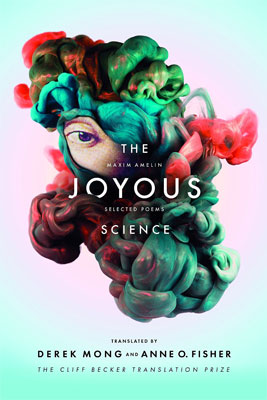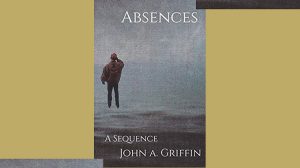The Joyous Science, Selected Poems by Maxim Amelin. Translated by Derek Mong and Anne O. Fisher / White Pine Press / 2018 / 978-1-945680-19-9 / 180 pages
 Part of the excitement of coming across the work of a new Russian poet is knowing that one will come across poetry that’s aware of its relation to history. That’s not always something to envy, often the historic tides have sought to wipe out the individual voice of the poet, and the voice then risen, as in the case of Joseph Brodsky, is one that counters historic pressure by setting itself, however small, against erasure. Maxim Amelin is definitely aware of history, in fact, he seems engulfed by it and wouldn’t have it any other way.
Part of the excitement of coming across the work of a new Russian poet is knowing that one will come across poetry that’s aware of its relation to history. That’s not always something to envy, often the historic tides have sought to wipe out the individual voice of the poet, and the voice then risen, as in the case of Joseph Brodsky, is one that counters historic pressure by setting itself, however small, against erasure. Maxim Amelin is definitely aware of history, in fact, he seems engulfed by it and wouldn’t have it any other way.
Translators Derek Mong and Ann O. Fisher do not disappoint us in The Joyous Science, Selected Poems, by Maxim Amelin. These translations published by White Pine Press in 2018 introduce the English-speaking world to a poet of baroque temperament refined by classical studies. The poems are jam-packed with classical references in a gorgeous display of formal pyrotechnics. When I first came across some of the poems in this collection they’d been published in online reviews such as Big Bridge and Jacket 2. Even then, the first impression one gets is in the formal structure, the varying syllabic lengths of the lines, that tightly compress the energy of the poem. This tension is held to considerable length and I find it to be the supportive charm to the otherwise irreverent nature of Amelin’s writing. In “The Statue Of Silenus In The Capitoline Museum In Rome” he writes:
Why does sadness strain your brow, O Silenus?
Why the gloomy visage and dejected mien?
Ah! Tell me! Who’s the one who bluntly stripped you
of what’s neither shamenor a sin but an appendage that’s precious-
your exalted prick! Who? And to right what wrong?
The statue of Silenus maintains its classical dignity in this piece. A horned figure, with a basket of grapes on his head, legs of a goat, and an offering of grapes in its left hand. The intention was most definitely a symbol of virility. But something happened over the course of time, an offended onlooker has taken a hammer in hand and knocked off the penis. Amelin asks who did it? And to right what wrong?
The answer is perhaps a new era in the form of a priest. A new religion finding its full representation in the form of a man with a hammer, clerical robe swaying in the wind, hammer in hand. Or maybe a woman who became tired of looking at it. Silenus was often depicted with a fully erect member. Often he was depicted mid-intercourse with whatever favorite barnyard animal the artist preferred. In any case, the penis was chopped off, flaccid or at high-salute. It did not matter. The new Rome preferred discretion, sexual or otherwise.
This lament for the classical world soon resurfaces in another poem (most of the poems in this collection are without title, being referred to in the table of contents by their first lines.) A poem opens:
Homer’s been shredded to quotes for the billboards:
his scrolls unfurl and spread
to paper the walls, his hexameters bobbing, -balloons
we tied to silk threads-
It isn’t long into the book when we realize we’re in the presence of an all-out classicist. And in truth, there’s nothing wrong with that. The past is held up as a qualitative measure by which to value the current society’s values. This only works if we take the best of the past and hold it up against the best of the present because no one can seriously hope for a return to the values of imperial Rome or Greece.
What most classicists value is not the classical society itself but the society of the classics. That is, the whole of literature in an imaginary library of Alexandria, a mental common iCloud, to be preserved forever. It’s not Rome that is eternal but the philosophic and poetic tradition that it inherited from Greece. It is the higher concept of literature and of preservation of the past, not as identity, but as the possibility of an identity. One is nothing in the presence of this everything.
But the ancient cup
of suffering was drunk and emptied for all time.
Its burning, bitter dregs
of grief and woe will be sweet and cool to me,
the Iron Age’s worthy stepson.
Elsewhere he writes:
I can’t twist my tongue
to scold my own writing. I’m living-
praise the Lord -at least three lives
at once. Is my time up or not?
“Who would you be if your life stopped
today?” I ask myself;
my self answers: no one.
This is a revealing answer and one American poets and readers of poetry might find difficult to grasp. We are raised on a poetry stuffed to the gills with individual personality. Often an American poet has built a career on personality alone. In Maxim Amelin’s work we find the personality often absorbed into the greater push of historicity. The color of his couch, the coffee breaks between writing sessions, types of cigarettes smoked (if any), the barking of a dog, demands of a landlord or a neighbor, the sounds of a crowded bar on a weekend night. We don’t find much of this real life stuff in Amelin’s poetry.
What we find instead are references to Pompeii, Mayakovsky, Nietzsche’s Zarathustra, Peter the Great’s military strategist and alchemist Jacob Bruce (who gets his own brilliant epic poem), Count Tolstoy, and others. All dry stuff indeed were it not for the energetic prowess of Amelin’s writing.
“The Joyous Science,” the title poem of the collection, is a sprawling poem about Jacob Bruce who, as has been noted, was military strategist for Peter the Great, as well as an important astrologist who’s credited with establishing Russia’s first observatory, writing its first textbook on geometry, and publishing its first astronomical calendar.
However, he was also the subject of the people’s curiosity who often told strange tales of his alchemical powers. The superstitious tales of the people supply the content material for the poem which was written in six-beat dactylic dolnik but which has been translated into ballad form in English. This suits the poem well, it gives it a folky nature, so that when we hear of birds with human heads and the alchemist making it snow in summer it feels like a Folk Horror film made in England. It also gives it a quick movement that’s highlighted by Amelin’s quick wit, bringing to mind the writing of Guillaume Apollinaire in Alcools.
A central theme through the collection is resurrection. Early on he writes:
Let foe follow foe, for all are earthly
vanity. The foliage that’s fallen
down won’t wither, it will redouble.
The sad vigil ends with morning’s adulation.
And we wonder here at the poet who is so concerned with time, with its personages and actions, with its continuity, that he is also concerned with the end of time. The end of history. This is the Christian aspect of Amelin’s writing, the body and soul duality. He is aware of this aspect of his nature and riffs on it throughout the poems.
I’m cleaved into two hostile halves,
I’m faced with two good options:
The soul’s reason-killing blaze
or the soul-killing cold of reason?I find I’m unified half-snake, half-bird-
first I plunge from above, then soar
up from below. I traverse both earth
and sky unsurely, stuck here in midair.
This middle point is a good place for a poet. The half-bird, half-snake image brings to mind the Aztec god Quetzalcoatl who brought to the people the gift of the arts. I don’t know if Amelin had this in mind but he would probably smile at the thought of it. In the west, especially in the United States, the desire to completely abandon the past doesn’t always work to the benefit of American letters. Sometimes one feels that the past is greater in its absence, that the ghosts we try to restrain are loudest in their denied reality. Julio Cortazar’s tiger comes to mind or the best of North American southern gothic. The past exists all around us and at all times. Maxim Amelin’s poems fit into this very Russian mentality. In “Katabasia For St. Thomas Week” he writes:
Whoever’s been born has felt the pangs
of thirst or hunger more than once.
He’s been resigned to poverty.
Even in barracks or labor camps,
where all that is human is foreign
he ponders Ovid’s poetry.
T.S. Eliot said that tradition is not something you inherit. It is something you earn. I think of this when it comes to Russian poetry. Osip Mandelstam used his exile to contemplate Ovid and his own exile. Joseph Brodsky used his sentence of hard labor to take pleasure in the slower rhythm of agricultural life, using the time for reading Robert Frost, W.H. Auden, and other English-language poets which would dramatically alter his own style and life.
Like the two faces of Janus Maxim Amelin’s work faces forward and back, rouses pagan sympathy while remaining stalwartly Christian, he is a son of Third Rome, a long Russian enlightenment, is aware of himself as a poet and chronicler of the history of Russia. Having said all of this, the tension of a dual nature is what gives his work the spark of wit and that makes him so enjoyable. This is a book full of erudition but it is not a stiff book. Amelin’s aesthetics are formal but innovative. He is religious but in a social way, the redemption of the whole greater than that of the singular. His concern is for the eternal only in that eternity ends. A contradiction? No, it’s poetry and in the end, Amelin’s concerns are strictly poetic. In yet another poem without a title he writes:
……In erecting housing
projects, they snatched the last gravestones
and took them away,
a cemetery’s leftovers -moss
-covered and decayed.How decisively time erects and
razes, leaving every stone upturned.
Alexandria!
You who preserved verse through such unrest
and storm, a hundredtimes are you blessed…..





Leave a Reply